30 Hidden Signs of Anxiety in Children That You Need to Know
One of my children was recently diagnosed with an anxiety disorder, and I didn’t see it coming.
I knew my child struggled in certain situations, but I didn’t think she had anxiety.
That day we got home from the doctor’s office after hearing the diagnosis, I went straight to my closet, shut the door, curled up in the corner, and fell apart.
How did I miss it?
Bonus: As a bonus for joining my weekly newsletter, get this free checklist to help you watch for these hidden signs of anxiety in your child.
This Is Why
Months after my daughter’s diagnosis, I still feel guilty that I didn’t see the signs earlier.
The truth is that you never think it will happen to your child.
Maybe you’ve read about how anxiety disorders are one of the most common health issues for kids and adolescents these days…but that doesn’t apply to your child.
Sure, your child may struggle a bit in certain situations – maybe they have a hard time falling asleep at night or get extra nervous about tests at school or worry about making friends (and keeping friends) – but that’s just part of childhood, right?
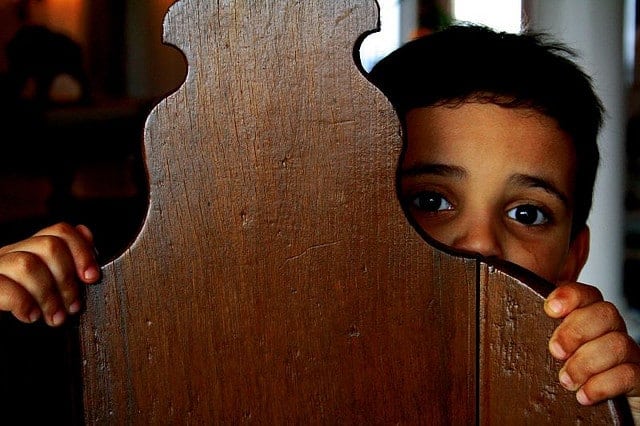
But Here’s What I Learned the Hard Way
Every child experiences anxious feelings, so yes, that is just part of childhood. But sometimes, those anxious feelings are a sign of an underlying anxiety disorder.
In other words, for some kids, those anxious feelings are a sign that their brain overreacts to some triggers. Their bodies get stuck in a constant loop of the fight or flight response. Their brain and body feel the same as if they were constantly being hunted by a hungry lion.
How common is it? One study of over 10,000 kids discovered that more than 30 percent of those children had an anxiety disorder.
Won’t Kids Just Get Over It?
Honestly, that’s what I thought. I thought we could cope with my child’s sleep struggles and her endless worries about school, and eventually she would just grow out of them.
But as a child’s brain develops, their anxiety can intensify. Left unchecked, childhood anxiety can cause other serious issues.
Academic struggles. Depression. Substance abuse. Eating disorders. And my throat feels tight as I type this next part because this isn’t theoretical or a statistic – this could happen to my child – kids with anxiety are at increased risk of suicidal thoughts.
This is my baby. When I held my baby in my arms that very first time years ago, I didn’t yet know her brain would just happen to be a little too sensitive to triggers and stress.
It took me too long to realize my child might be struggling with an anxiety disorder. Two different pediatricians didn’t suggest she may have an anxiety disorder, even after I described the classic symptoms. The only reason we found out was because I felt in my gut that something wasn’t right, so I took her to a third doctor.
And now I’m on a mission to help other parents notice the signs of childhood anxiety early.
Related: 8 Surefire Ways to Calm an Anxious Kid
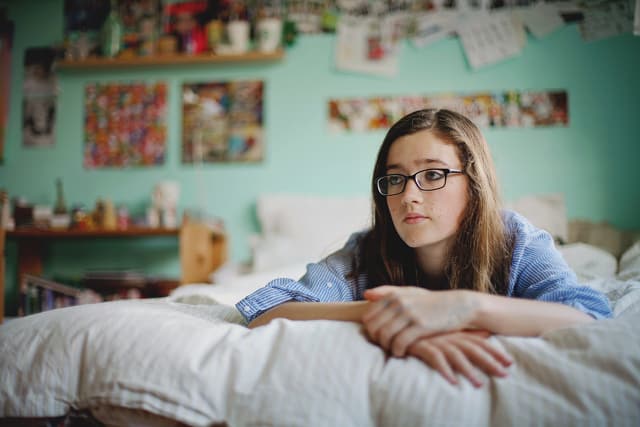
How Do You Know If Your Child Has Anxiety?
The hardest part is that your child won’t come out and say, “I feel anxious.” You have to watch for clues.
But first, a warning: I am not a medical expert. I’m just a mom who’s been in your shoes, and I know what it’s like to worry about your child.
So I compiled these signs and symptoms from several reputable resources to give you one single checklist for symptoms of anxiety in children.
At the end of this post, you can also get a free printable childhood anxiety symptoms checklist that you can fill out and take to your pediatrician’s office.
This is the checklist I wish I’d had years ago for my child.
Anxiety in Children: A Symptoms Checklist for Parents
Please watch for these signs in your child and see your child’s doctor if you notice any of them on a regular basis.
But keep in mind that experiencing one of these symptoms does not necessarily mean your child has an anxiety disorder. Your child’s doctor will likely be most interested in whether the symptoms are getting in the way of your child functioning in their daily life or if they’re impacting the rest of the family.
For example, if math homework every night leads to a meltdown or if it takes your child so long to fall asleep that she’s feeling tired the next day and unable to focus at school – those may be signs of an anxiety disorder.
With that said, remember that anxiety doesn’t just go away on its own. Without treatment, childhood anxiety can intensify and spur other serious mental health issues.
Note: For the source where you can find out more about each of these childhood anxiety symptoms, click the »» character after the checklist item.
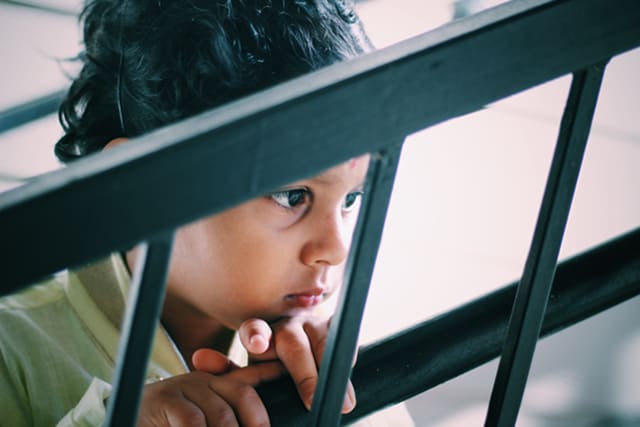
Listen for These 15 Phrases That Are Code Words
If your child says anything like this on a regular basis, these phrases can be code words for “I’m anxious”:
- “My tummy hurts.” or “I feel like I might throw up.” Anxious feelings often present in the body. Stomachaches are very common for anxious kids because in the throes of anxiety, the body redirects blood flow from the abdominal organs to the brain, which slows down digestion. That experience can cause nausea. »»
- “I’m not hungry.” When digestion shuts down because of anxiety, so does the need to eat. »»
- “Please don’t make me.” or “Can I just stay home?” or “I don’t want to!” Kids with anxiety may start to avoid stressful situations. »»
- “Please don’t leave me.” or “Is it time to leave yet?” or “I want to go home.” Anxious kids in a stressful environment or situation will typically ask to leave so they can get away from the stress. »»
- “I feel like I can’t do anything right.” or “I feel like there’s something wrong with me.” Kids with anxiety can be very hard on themselves. »»
- “I can’t do it!” or “Can you do it for me?” Anxious kids tend to expect perfection from themselves, so they may avoid a difficult task to avoid making a mistake. »»
- “I’m sorry.” Because anxious kids are typically hard on themselves, they may apologize often, especially for small things. »»
- “Are you mad at me?” Many anxious children will seek constant approval or reassurance from others. »»
- “I can’t fall asleep.” Anxious kids may have difficulty falling asleep. »»
- “I’m so tired.” Kids with anxiety tend to have difficulty falling asleep or getting restful sleep, but sometimes the only sign you’ll see may be them complaining of feeling tired. »»
- “But what if…? What if…?” Anxious kids typically worry constantly, sometimes about things that are far in the future. »»
- “Nobody wants to play with me.” or “I don’t really have many friends.” Some kids with anxiety experience an intense fear of social situations. »»
- “Are you sure…?” or “Do you think…?” Anxious kids tend to ask lots of questions to seek reassurance from you about their worries, like “Are you sure we’re not running late?” or “Do you think the teacher will like my science project?” »»
- “I feel hot.” or “I can’t breathe.” An anxiety attack (or more commonly referred to as a panic attack) can cause hot flashes and sweating. Other panic attack symptoms include a racing or pounding heartbeat, trembling or shaking, shortness of breath, chest pain, dizziness, lightheadedness, tingling sensations, and chills. »»
- “I have a headache.” Anxious feelings or a panic attack can also cause a headache. »»
Related: 10 Best Journals for Kids That Will Boost Your Child’s Emotional Intelligence
Watch for These 15 Behaviors
The following behaviors can be a sign or symptom of childhood anxiety. This list is not exhaustive, but it gives you one single list of the most common child anxiety symptoms as compiled from several sources.
- Cries often or often seems sad »»
- Becomes angry easily »»
- Acts extremely sensitive, such as taking things personally »»
- Gets in a bad mood easily or with no clear reason »»
- Acts irritable often »»
- Seems to have difficulty concentrating or focusing »»
- Gets scared easily, sometimes due to phobias or exaggerated fears »»
- Wakes up crying in the middle of the night because of bad dreams or nightmares »»
- Behaves in obsessive or compulsive ways, such as worrying about germs, arranging objects in a specific way, finger tapping, and so on »»
- Experiences intense tantrums or meltdowns »»
- Turns down opportunities to socialize with peers »»
- Seems overly concerned with their grades in school »»
- Overreacts to any constructive criticism from a parent or teacher »»
- Runs away or hides to avoid stressful situations »»
- Acts clingy when you try to leave them for a short time »»
Next Steps: What to Do With This Child Anxiety Checklist
If you need immediate relief to help your child with anxious feelings, here are 8 quick fixes to help your child feel better in those tough moments. You might also find it helpful to pick up a couple children’s books about anxious feelings to read to your child. Here are our favorites:
Then moving forward as a next step, take this child anxiety checklist and your notes to your pediatrician. If your pediatrician doesn’t take these signs seriously, find another doctor.
We had to talk to three doctors before someone took my child’s mental health seriously. When it comes to your child’s health, it never hurts to get a second (or third or fourth) opinion.
If you’re worried about how much it will cost to see a mental health professional for your child, I get it. I was worried too. Some health insurance plans don’t cover mental health as well as they should, which is a shame. If you’re in the same boat, here are a few thoughts to consider:
- Talk to your child’s primary care physician. They may have some knowledge of childhood anxiety and be able to offer some advice on coping strategies.
- Ask your child’s doctor if your area has a low-cost mental health clinic for children. It may take a while to get in with an appointment, but that’s better than never going.
- Pick up a good book on childhood anxiety for parents like The Opposite of Worry: The Playful Parenting Approach to Childhood Anxieties and Fears.
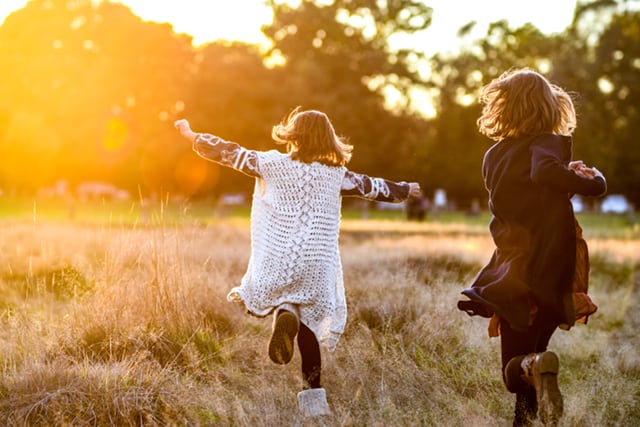
Get Your Free Printable: Anxiety in Children Symptoms Checklist
Use this checklist to evaluate your child for signs and symptoms of anxiety, then follow up with your child’s doctor.
- Get the free checklist. Join my weekly-ish newsletter and as a bonus, you’ll get the printable! Just click here to get it and subscribe.
- Print and fill out the child anxiety checklist. You may want to jot down notes in the margins and take a few days to watch and listen for the signs. Fill in the appropriate bubble for any day you notice that behavior.
- Make an appointment with your child’s doctor. Remember: If your child’s doctor doesn’t seem to take you seriously, get a second opinion.
- Help your child calm down. While you wait to meet with your child’s doctor, you can help your child cope with anxious feelings with these 8 surefire ways to calm an anxious child.
Here’s a sneak peek of your checklist:
Before you go, get my FREE cheat sheet: 75 Positive Phrases Every Child Needs to Hear
Your Turn
What would you add to this childhood anxiety symptoms checklist? Share with your fellow parents in a comment below.

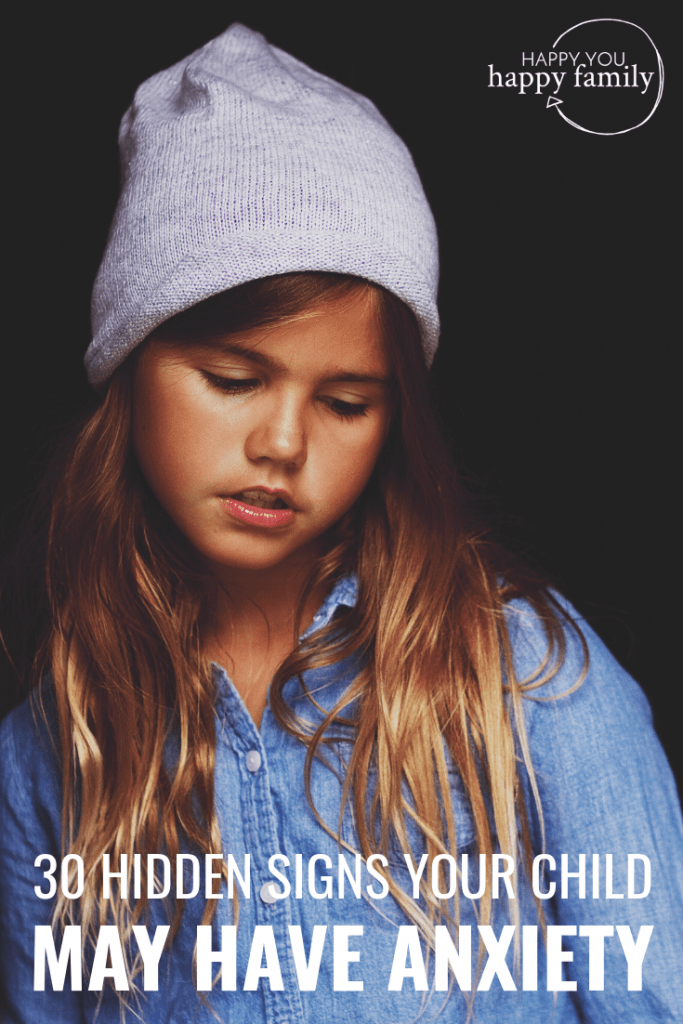
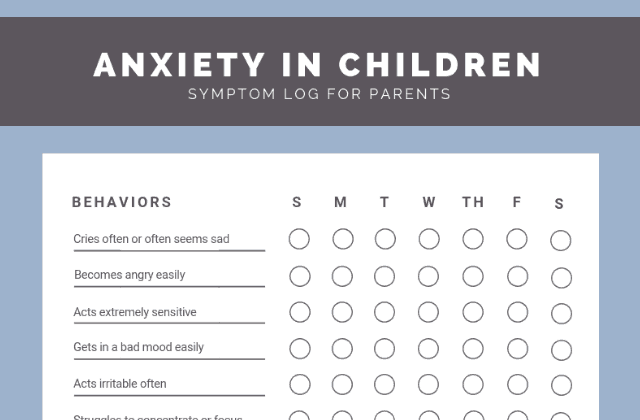

Thanks for bringing attention to childhood anxiety. Both of my kids have anxiety and it can be crippling if not helped.
My child was just recently diagnosed and is being treated for anxiety. I was the same way, just knew something wasn’t quite right but couldn’t get anyone to take the “mother’s intuition” seriously. At the advice of my child’s therapist we ordered a book called “It’s Not a Saber-Tooth”. It’s a great book to help children & parent’s understand the body’s response to anxious thoughts. As someone who knew very little on this topic I have found it to be a great resource.
We’re right there with you. In my case though, I’m having trouble getting strategies to treat the anxiety. My kid is 9. We have psychologists, psychiatrists, therapists in the mix but he won’t talk to them. Thoughts?
Find new ones, or perhaps one that uses pet therapy to engage with the child. Keep trying, don’t give up to you find the right team.
Find ways to authentically connect. Meet him at his level in interests he has. You might feel silly or strange with “play”, but the best way I believe is to let your child know you are there by joining them where they are. Anxiety can feel lonely They can feel mistrust that nobody understands. And maybe at this point nobody really does (that’s why you want him to open up to therapists). I had an extremely anxious daughter (who is a recovering young adult) and wish I could go back to connect more now.
This is a great post! My once fearless daughter developed debilitating anxiety in the first grade. She would eloped, avoid tasks (especially math and writing). It seemed her anxiety took over our world. She was sick a lot that year, had strep 5 times. She was diagnosed the next year with PANDAS/PANs. This is a rarely talked about autoimmune disease, that isn’t really rare at all. . Please take a minute to learn about PANDAS/PANs-visit: pandasnetwork.org
When anxiety escalates to a point in your child and you think it came out of nowhere and you can’t figure out how it’s taken over their and you life, please rule out PANs/PANDAS.
My child has similar symptoms to these. How is this being treated? Medication? I have a fear of medicating my child this early in life but want to make sure she doesn’t grow up with issues.
Find a local mental health therapist!!! Behavior therapy is an absolute life saver!!
My child is in therapy for anxiety. One dr diagnosed her at 6 with anxiety and OCD symptoms and qe did therapy a little while and then it seemed to get better after her step brother entered the picture. He was a couple years older and a great support. Then we lost him in a car accident and her world turned upside dow. We are back in therapy but I suggest always going to and staying in some mental health program. We had trouble with the school helping with absences but I finally insisted on a 504 plan or I would report them to IDEA and I got it! There are many resources out there. DO NOT BE AFRAID to fight fornyour child! They need your support if they have anxiety! They have to deal with enough on thier own!
Thank you so much! Im just beginning to understand that my 8 year old daughter has anxiety. The symptoms have always been there i just didnt realize it was anxiety. Do you have any ideas of how to help her?
I was searching for the good topic to research and read, I got it this article on your blog, Thank you so much.
Awesome post and definitive guide. Especially loved the 15 phrases. Parents should be more careful about anxiety. Maybe, you are lucky and expert enough to diagnose anxiety but many of us can’t do it. Whatever, Thanks for the great post and hope your daughter is fine now.
my children both have some degree of anxiety and this list can be extremely helpful to parents who may be wondering if their children do too.
Thank you for writing this article. I am just wondering what age range the checklist is suited for? I have a feeling that my son might have anxiety but he is only 3.5 years old. I’ve spoken to his ped about it and she seems to think this is developmentally typical for his age and that he will grow out of it. I’d like to bring this checklist to her if it’s suited for his age.
Hi Jo Jo, I can’t reply to every comment but noticed yours here today and wanted to chime in. The sources linked from each item in this list don’t specify ages. They refer to these being symptoms in children and teenagers. If you’re noticing these signs in your child, the best thing to do would be to take notes on what you’re seeing and then bring it up with your child’s primary care doctor. But since it sounds like you’ve already done that, it doesn’t hurt to get a second opinion. You can ask around to find out which doctors in your area have experience with childhood mental health issues. For example, in a Facebook group for parents in my area, I asked for recommendations of doctors who had helped other parents’ kids with mental health issues. Hope that helps. <3
Wow, I wish this had come out when I was young. I can make sense of the way I was. I wish I had known this with my kids. I now notice some of this in them.
Oh wow. I definitely have wondered about my oldest child a bit and now after reading this, I think she does struggle with a little bit of anxiety! Thank you for bringing awareness to this topic.
My son was diagnosed with anxiety in 6th grade, was miserable prior to medication. It did help but now that he is 17 he refuses to take it anymore. He has been in trouble and has been caught drinking several times. He stays so angry and moody. Any suggestions on how to get him to take the medication again? He feels that means something is wrong with him and refuses to accept he does need the medication. Please help I’m so desperate!
I echo someone else’s comment — what age is this for?
Hi Erin, the sources linked from each item in this list don’t specify ages. They refer to these being symptoms in children and teenagers. If you’re noticing these signs in your child, the best thing to do would be to take notes on what you’re seeing and then bring it up with your child’s primary care doctor. Hope that helps. <3
I understand the ups and downs of all of this and want to offer some additional insight. My anxious kids are now young adults (28, 26, 23 and 12) and what I wish I knew when they were young is this:
1. In the case of two of them, learning disabilities presented themselves, as well. It is difficult to disentangle the emotional fallout from dyslexia or dysgraphia and anxiety. So, my advice is to research both in parallel. Very often these are highly intelligent children that function well in some areas but are so acutely aware that they are “different” that anxiety becomes a symptom of the learning difference. Treating just the anxiety won’t help – addressing an underlying learning issue may ease anxiety.
2. Anxiety can be circumstantial or genetic. Sometimes anxious kids are highly empathetic and don’t know how to process emotions. In my case, I was a high functioning anxious person and my children were picking up and emulating the energy I was bringing to the situation. Addressing the child’s system without addrsssing the family system will have limited benefits. I finally figured this out with my 4th… where energy became a “thing” that we talked about. We handled anxiety as a problem to be solved and advocated for.
All of my children have learned to self advocate which is crucial to managing this lifelong issue. They are successful and self aware and one is now a mental health counselor due to her journey. Excellent article… I wish I knew them what I know – and you know – now.
I was an extremely anxious child who was diagnosed with ADHD as an adult. As a child, I exhibited many of the symptoms described in this article. For years, I was treated for anxiety, and later depression, only to learn that they were byproducts of my ADHD that I’d unknowingly had since childhood. Now that the ADHD is being treated, my anxiety has significantly diminished. Im not suggesting that all children with anxiety have ADHD, but rather that it is very common for clinicians to diagnose and treat anxiety and/or depression in both children and adults without considering an underlying cause. “You’re just an anxious person by nature” is what I heard from professionals all of my teenage and adult life. So essentially, as in my case, the wrong symptoms often end up being treated. Just some food for thought when treating anxiety &/or depression in people of all ages. Thanks for a great article!
My sister has noticed that her daughter overreacts when something happens that wasn’t part of a given plan. As I was reading your article, you state that every child can experience anxious feelings and that it could be a sign of an underlying disorder. My sister was thinking about taking her to behavioral therapy to see if that will help her with her feelings.
I believe my 9 year old daughter has anxiety. Can her pediatrician diagnose her or do we have to talk to a therapist of some sort to be diagnosed? Thanks for all of the wonderful information.
Hi Anna, I believe to get a formal diagnosis, you need to go to a psychiatrist. However, if that’s not something you can do, your pediatrician will still be an excellent resource. It’s a great first step to see your child’s regular doctor. Hope that helps. <3
My daughter experiences lots of these symptoms. She’s just turned 5! We are making great progress but what I’ve learned is that trauma early in life can lead to anxiety and MANY other difficulties. What we as parents must realize that TRAUMA isn’t just physical and it’s not just for abused kids, foster kids, etc… Kids of divorce have trauma, kids who experienced a traumatic birth, kids whose mother experienced lots of stress in pregnancy (the mom’s stress hormones affect the baby’s stress hormone levels)….
Truth is, we’ve all experienced traumatic things that have affected our brains.
I HIGHLY recommend the following books to help give you insight and wisdom to give your child “felt safety.” First of all, research Dr. Karyn Purvis and Dr. Cross who developed TBRI-trust based relational intervention. There are lots of YouTube videos, too. Awesome conferences available from Show Hope.
Books that I have loved “The Whole Brained Child”. “No Drama Discipline” and “The Connected Child”. I’ve been amazed at how this is changing my home and my relationship with my daughter. I can’t recommend it enough!!
Thank you for your post on anxiety in children. I suspect my 5 year-old child may have anxiety issues but have not yet had a formal diagnosis. I thought I would share another condition which is associated with anxiety in young children- Pollakiuria.
Last year when my daughter was 4 years-old she had an episode of Pollakiuria- which is sudden frequent urination in a child who was previously toilet trained. This does not mean accidents. She would ask to go sit on the toilet every 5-10 min and stay there complaining of the urge to urinate but having difficulty producing any urine. We saw a renal specialist and exams showed her renal function was not impaired. When learning about Pollakiuria I found that it is associated with anxiety. For instance, one sign is a child expressing thoughts about a parent dying. At the time my 4 year-old was telling me this daily. She was telling me things like “I will miss you when you die. Who will take care of me when you die?” I suspect anxiety may have been an underlying cause of her episode of Pollakiuria. Her urinary symptoms resolved after a few months and she is doing well with that now. That physical manifestation of anxiety has made me more aware of her mental health. I hope normalizing discussions on mental health will help us all find the help we need to thrive.